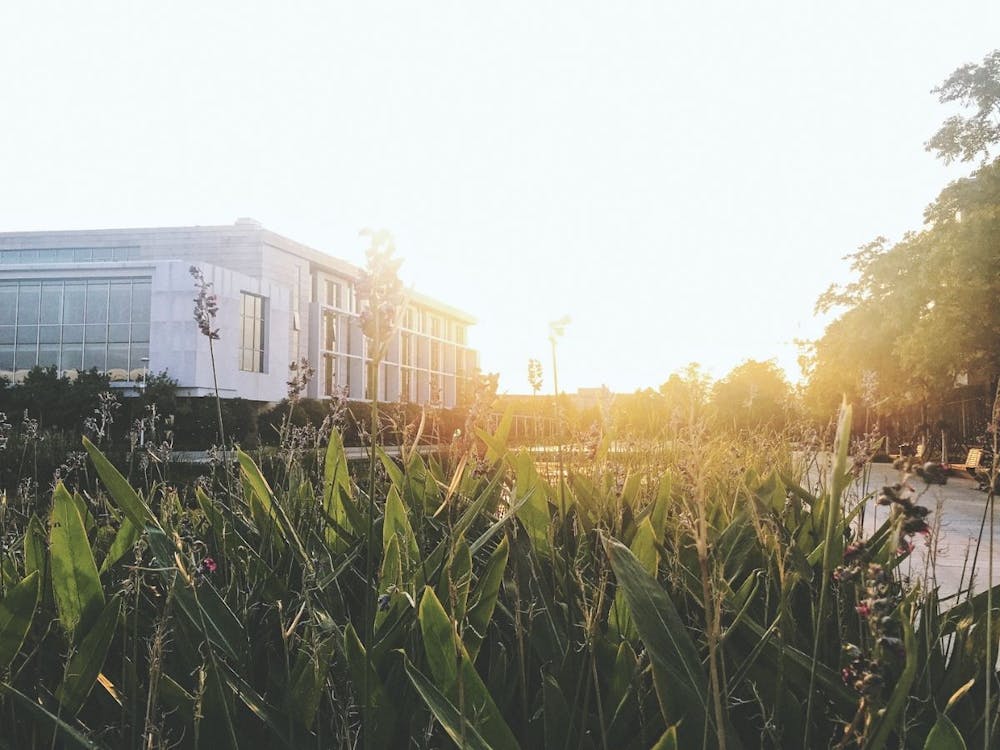Undergraduate students at Duke Kunshan University (DKU) in China are contributing written and multimedia content to The Chronicle to be published every other Friday.
When I tell somebody I’m studying at Duke Kunshan University in China, a frequent response is, “How does academic freedom work on campus?”
I’m from Ukraine, a post-Soviet country which for years has been trying to eradicate any remains of the USSR. Communism, in the eyes of Ukrainians, was an evil machine destroying our national identity, suppressing the elite and killing those who spoke out—and those who didn’t.
For Ukrainians, embracing the Soviet mentality and political structure means a return to a time of atrocities.
And here I am, studying for four years in a communist country. Although I knew that DKU was designed in the American liberal arts fashion and promised to cultivate students into globally rooted citizens, I still had my doubts. The program is located in China and financed in part by the city of Kunshan. Getting a “red” education was my greatest fear.
I did not want to be forced to blindly follow party propaganda and be taught the values of communism, because that would mean betrayal. A betrayal of my ancestors who starved to death in the 1930s. A betrayal of my great-grandfather, who was sent to a labor colony in Siberia for his ideas and opinions. A betrayal of my values and national identity.
But I decided to give DKU a chance.
And now, as a rising sophomore, I know for sure that I’ll be graduating with the furthest thing from a "red" education.
Throughout my freshman year, I stood witness to numerous instances of DKU encouraging students to engage in critical discussions about China and China’s politics in and outside of the classroom. My very first semester started with an economics professor debating Mao Zedong’s socialist economic planning and a public policy professor assigning an essay to analyze whether China had mishandled the 2005 Jilin chemical plant explosions. As the year progressed, I saw even more striking examples of the university facilitating these kinds of conversations.
As students adapted to the uncharted waters of academia in a country where controversial subjects are considered taboo, I heard more and more discussion regarding the Hong Kong protests or the mistreatment of Uyghurs. I can think of instances where I slept through microeconomics lectures after midnight conversations with my Chinese roommate and friends about the domestic news media ecosystem.
“I do not think the government is always telling us the truth,” one of my Chinese friends said the other evening, as we were debating news coverage of the Taiwanese elections. Her remark sounded casual yet so surreal for me. During their lives, Chinese students are exposed to a propaganda campaign which they are not allowed to vocally disagree. However, the safe zone of DKU’s academic freedom gives them, as well as all international students from more than 40 countries worldwide, the chance to learn without any politically or socially constructed limits.
While DKU obviously wants its students to understand the basics of Chinese language, culture, and history, it clearly deviates from the traditional path of domestic universities regarding academic freedom on campus. My final fears of getting an education influenced by propaganda vanished when I heard Chinese students juxtapose the curriculum for China in the World, a freshman core course, with their prior education about China in primary and secondary schools. The course presents a nuanced view of China’s domestic and international spheres of influence in the last century, focusing on topics pertaining to science, trade and warfare.
Instead of simply toeing the party line, the course asks students to engage amongst themselves to find common ground and ideologies to debate, aided by the diverse backgrounds of the students. Do modern Chinese views on race and eugenics stem from traditional Confucian values of human “quality?” Are China’s efforts to expand its infrastructure network through the Belt and Road Initiative an attempt to return to a tributary trade system? What are the benefits and drawbacks to a multipolar world where the Chinese military maintains a presence to rival that of the United States? These questions and more form the ethos of the course and encourage us to consider a multitude of perspectives.
Built as a joint Sino-US venture, DKU was not able to develop platforms solely centered on the United States or China. Instead, the University has become an unprecedented mix of the best educational and scientific practices. DKU is a bridge to connect East and West, rather than an establishment serving the political interest of one.
Of course, DKU, as a China-based university, must navigate Chinese law. DKU must require all students from the Chinese mainland to take physical education classes and military training, just as it must require students from mainland China, Hong Kong, Taiwan and Macau to take Chinese Society and Culture courses.
Nevertheless, academic freedom at DKU has never been a matter of intervention. Academic freedom is the very essence of the program. Coming to DKU, I was afraid I would be studying at a university that would force me to pursue an education shaped by communist propaganda, but where I ended up was a completely different place. DKU is a place that constantly forces me to step out of my comfort zone and engage in cross-cultural discussions that are limited only by one’s imagination. DKU forces me to argue and collaborate. It forces me to challenge what I believe. And above all, it forces me to become a truly globally rooted citizen.
Tanya Torchylo is a first-year in the second-ever graduating class of the Duke Kunshan campus’s undergraduate program, located outside Shanghai, China.
Get The Chronicle straight to your inbox
Signup for our weekly newsletter. Cancel at any time.

